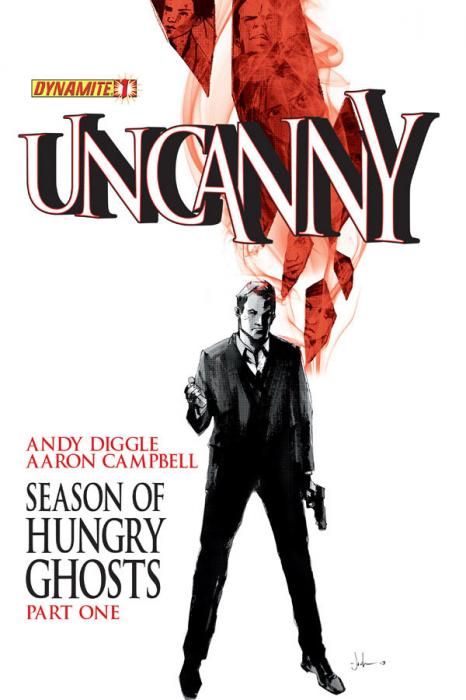"Uncanny" #1 begins Andy Diggle and Aaron Campbell's new ongoing series and crime story about Weaver, a man on the make who has an empty life and an impressive but limited supernatural power.
Diggle's title for the first arc of "Uncanny" is "The Season of Hungry Ghosts." The ghosts in question refer to a Chinese belief and related customs. It is Buddhist term, referring to creatures driven by animalistic desire and emotional need, so little enlightened that they are not fully alive. The Season of Hungry Ghosts, a.k.a. the Festival of the Dead, is when ancestral ghosts return to wander the earth and are hopefully placated by offerings from their living kin. It is still widely celebrated, in East Asia and elsewhere, on the fifteenth night of the seventh lunar month.
On the first page of "Uncanny" #1, Diggle introduces Weaver, the first-person narrator and main character, who introduces the reader to the setting. Campbell's images of lanterns strung across city streets are a lush counterpart to Weaver's thoughts, and the warm colors of Crabtree's palette complement Campbell's attractive brushy shading and liberal inks.
Despite the supernatural element, Weaver is version of a familiar archetype. He's a grifter, someone who is always on the run or in the hustle, and as he says himself, he always has an eye on the next hit or mark. Diggle doesn't expand much on this bare outline. In later pages, Weaver reveals little more to his character than his ability to improvise in a tight situation, hardly a defining feature in a crime story antihero.
"Uncanny" #1 also doesn't address the biggest mystery of all, which is why Weaver is broke. He's a healthy, able-bodied man with a good face, confidence and even a supernatural power. Diggle doesn't yet reveal why Weaver has the outer package of privilege but so little to show for it. The only side effect Weaver seems to suffer from his powers is a "comedown" as the drug-like hit of information in his brain dissipates like water on a hot day, leaving him as he was before. There's a subtle analogy to addiction and to loss here, but Diggle barely scratches the surface of Weaver's soul and instead prioritizes the action.
Like the main character, the setting also rapidly loses its specificity and distinctive flavor. After the reader enters the casino, neither the art nor the script further alludes to Singapore, other than the Asian ethnicities of various characters. "Uncanny" #1 could easily be happening in Vegas or Monaco or any other gambling city. Singapore is a rich, cosmopolitan, melting-pot country, so this facelessness is actually realistic. However, besides the theme of ghosts, Diggle's choice of setting also doesn't add anything to a plot that is predictable and bland.
Diggle's timeline is compressed, linear and simple. The action of "Uncanny" #1 begins at a poker table. A gambler goes big, loses and a chase ensues, during which he is conveniently snatched away from his pursuers by a third party. If this sounds achingly familiar, it's because Diggle is serving up this old dish straight up.
To Diggle's credit, his pacing skills are excellent, as is Campbell's handling of the action scenes. Campbell shifts scale and camera angles between panels, and his facial expressions and body language also hook the reader into the story, especially in a rare comic moment in which Weaver shrugs when his escort companion departs.
Despite its predictability, Diggle and Campbell create real, enjoyable suspense in "Uncanny" #1 on the strength of their ability to keep the action tight and vivid. As a debut issue, it does the job of being a teaser and hinting at future potential, and as Weaver's past is gradually revealed, the story can only get more interesting.

